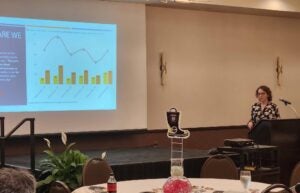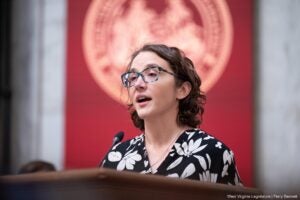At 21, he was a volunteer firefighter in his hometown where he responded to a call in his own community that changed his life forever. In the early morning hours, he heard the sirens and was subsequently one of the first on the scene of a fatal, single-vehicle car wreck. Despite his best efforts, doing everything he could based on his training and experience, the driver did not survive.
As Allen began to fill out the necessary paperwork, he took the driver’s license out of the man’s wallet, only to find out that the deceased driver was a member of his own family. It was the late 1990s, a time when there was very little, if any, acknowledgement of mental health in the fire service. Left to process this trauma on his own, Allen unsurprisingly began to experience symptoms of PTSD and eventually stepped away from the fire service.
It would take nearly two decades for him to open up about that call and begin the healing process, after which he was able to return to the first responder world as a full-time EMT.

Kari, a clinical mental health counselor, was working through her own EMS training and was amid her doctoral program in Counselor Education and Supervision when the COVID-19 pandemic hit. Being aware of her husband’s experience as a first responder gave her unique insight into the struggles that many of these professionals face, but often do not discuss, and she couldn’t help but notice the numerous “Heroes of the Pandemic” campaigns that started popping up.
“I believe these labels were well-intentioned and meant to show appreciation in a time of fear and hardship,” Kari said. “But it’s also important for us to consider the underlying message of such slogans: ‘Superheroes don’t need rest. Superheroes don’t need help. Superheroes are there to protect and save the rest of us.’”
In 2022, her interest piqued, and Kari decided to focus her doctoral dissertation around his concept.
“While there are certainly negative stereotypes, which are also addressed in my research, I was particularly interested in the seemingly positive superhero stereotype because it unintentionally deprives first responders of humanness and a need for care,” Kari said. “These stereotypes imply super-human capabilities without allowance for human vulnerability, and I was curious about how that would relate to the mental wellness of first responders.”
Her article, Under Fire: Meta-Dehumanization and Burnout Among First Responders, was published in the Journal of Employment Counseling in August 2023 and was quickly recognized by the American Counseling Association.
In April 2025, Kari received an award from Wiley Publishing noting that her article was ranked within the top 10% of most-viewed papers published by the journal.
“It was emotional when I first found out, and it was encouraging to see so much interest in the topic,” she said. “It was also my first-ever publication, so that added an extra layer of excitement.”
Her research clearly struck a chord with professionals across the country, which lead to the Fire Service Psychology Association inviting her and Allen to speak at their annual conference in early October.
Their session, titled Re-Humanizing the Heroes: Recognizing and Confronting the Dehumanization of First Responders, brings together Kari’s research and Allen’s personal, lived experience.
Through her research, Dr. Mika-Lude found that “meta-dehumanization” — the perception of being viewed as less than human — can fuel burnout, reduce self-efficacy, and even increase suicidality among first responders.

Kari and Allen continue to advocate for change together by speaking at conferences across the country, leading discussions, and working with first responder organizations to create trauma-informed, inclusive workplaces that acknowledge the full humanity of those who serve. Kari also had the opportunity to present her research to the West Virginia State Legislature.
Every time they share their story, Allen leads by example, speaking openly about his experience and the power of vulnerability.
“The most critical point for the public to understand is that helpers are human,” Kari said.
For Kari, the recognition represents more than a professional milestone. It’s taking research beyond the classroom and into the world, where it can heal, transform and humanize the heroes among us.





